Difference between revisions of "Ores"
(→Processing) |
m (Revised the section about cobalt to be accurate to its actual color.) |
||
| (38 intermediate revisions by 21 users not shown) | |||
| Line 1: | Line 1: | ||
| − | + | '''Ore''' is a basic resource item, usually obtained by mining [[Asteroid]]s. Using a [[Hand Drill]] or ship-mounted [[Drill]] will destroy the rock and release the Ores as objects in the world to be collected. While useless on its own, Ore can be processed in a [[Refinery]], [[Arc Furnace|Basic Refinery]], or [[Survival Kit]] to be turned into a useful [[Material]]. | |
| − | [[ | + | == Appearance and Identification == |
| + | Identifying ore patches purely by sight can be frustrating, especially if there are two similar ores next to one another (such as Platinum and Silicon). It is for this reason that an [[Ore Detector]] is always highly recommended for the initial identification process. The Hand Drill has a small Ore Detector built in, whereas a ship-based Ore Detector has a larger detection radius. This will put the name of the ore on the [[HUD]] in approximately the center of the ore patch. However, once you have identified the vein you wish to obtain, it can often be more effective to rely on sight to guide your mining, and so a [[Spotlight]] is almost always useful for this purpose, to more easily see where one vein ends and another begins. | ||
| − | + | See the images and descriptions in the table below for more information on each ore. | |
| − | + | == Ore Information == | |
| − | == | + | === [[Stone]] === |
| + | {{SimpleItembox|Mod:Vanilla/Ore/Stone|Mass||Volume|L|RefineAmount|g}} | ||
| + | [[File:Ore Stone.jpg|thumb|left|A sample of [[Stone]]]] | ||
| + | Color varies slightly. Typically a matte midtone grey, the appearance of stone can vary a bit between brown and black. | ||
| − | + | Rarity: 31% <ref name="raritytest">[[File:Ore_Rarity_Test.xlsx]] Space Engineers v01.047 - New World Generator, Asteroids Scenario, Extreme Asteroid Amount (16 large, 80 small)</ref> | |
| − | + | <div style="display:block; clear: both;"></div> | |
| − | |||
| − | |||
| − | |||
| − | |||
| − | |||
| − | |||
| − | |||
| − | |||
| − | |||
| − | |||
| − | |||
| − | |||
| − | |||
| − | |||
| − | |||
| − | |||
| − | |||
| − | |||
| − | |||
| − | |||
| − | |||
| − | |||
| − | == | + | === [[Iron Ore]] (Fe) === |
| + | {{SimpleItembox|Mod:Vanilla/Ore/Iron|Mass||Volume|L|RefineAmount|g}} | ||
| + | [[File:Ore Iron.jpg|thumb|left|A sample of [[Iron Ore]]]] | ||
| + | '''<span style="color:maroon">Red and Grey<span>'''. Iron is fairly easy to identify due to being so common and in such contrast to the grey of the surrounding stone. Focus on looking for reddish, rust-colored areas if Iron is a priority. | ||
| − | + | Rarity: 50% <ref name="raritytest"/> | |
| + | <div style="display:block; clear: both;"></div> | ||
| − | + | === [[Nickel Ore]] (Ni) === | |
| + | {{SimpleItembox|Mod:Vanilla/Ore/Nickel|Mass||Volume|L|RefineAmount|g}} | ||
| + | [[File:Ore Nickel.jpg|thumb|left|A sample of [[Nickel Ore]]]] | ||
| − | + | '''<span style="color:brown">Brown</span>'''. Nickel is a straight, flat, brown, which when it spawns next to Iron shows strikingly enough to be discernable. | |
| − | + | ||
| − | + | Rarity: 2% <ref name="raritytest"/> | |
| − | + | <div style="display:block; clear: both;"></div> | |
| − | + | ||
| − | | | + | === [[Cobalt Ore]] (Co) === |
| − | | | + | {{SimpleItembox|Mod:Vanilla/Ore/Cobalt|Mass||Volume|L|RefineAmount|g}} |
| − | | | + | [[File:Ore Cobalt.jpg|thumb|left|A sample of [[Cobalt Ore]]]] |
| − | | | + | |
| − | | | + | '''<span style="color:#0047AB">Blue</span>'''. The blue streaks are relatively easy to see, but it could be mistaken for Magnesium and vice-versa. The best way to distinguish between them is that cobalt ore has a much lighter blue and has more bluish color than grayish base. |
| − | | | + | |
| − | | | + | Rarity: 2.2% <ref name="raritytest"/> |
| − | + | <div style="display:block; clear: both;"></div> | |
| − | + | ||
| − | + | === [[Magnesium Ore]] (Mg) === | |
| − | + | {{SimpleItembox|Mod:Vanilla/Ore/Magnesium|Mass||Volume|L|RefineAmount|g}} | |
| − | + | [[File:Ore Magnesium.jpg|thumb|left|A sample of [[Magnesium Ore]]]] | |
| − | + | ||
| − | | | + | '''<span style="color:blue">Blue</span>'''. Rather distinct, Magnesium is not very hard to identify, but is fairly rare, so always keep a look out for the bluish hue! |
| − | | | + | |
| − | | | + | Rarity: 2.4% <ref name="raritytest"/> |
| − | | | + | <div style="display:block; clear: both;"></div> |
| − | | | + | |
| − | | | + | === [[Silicon Ore]] (Si) === |
| − | | | + | {{SimpleItembox|Mod:Vanilla/Ore/Silicon|Mass||Volume|L|RefineAmount|g}} |
| − | | | + | [[File:Ore Silicon.jpg|thumb|left|A sample of [[Silicon Ore]]]] |
| − | | Magnesium | + | |
| − | + | '''<span style="color:silver">Grey</span>'''. One of three greyish ores, Silicon can be the most difficult to spot due to how close its color and texture are to base stone. Its color will often vary to a light grey, almost white sheen, so look for uncharacteristically light patches. | |
| − | + | ||
| − | + | Rarity: 2% <ref name="raritytest"/> | |
| − | + | <div style="display:block; clear: both;"></div> | |
| − | | Silicon | + | |
| − | | Silicon | + | === [[Silver Ore]] (Ag) === |
| − | + | {{SimpleItembox|Mod:Vanilla/Ore/Silver|Mass||Volume|L|RefineAmount|g}} | |
| − | | | + | [[File:Ore Silver.jpg|thumb|left|A sample of [[Silver Ore]]]] |
| − | | | + | |
| − | | Silver | + | '''<span style="color:grey">Bluish-Silver</span>'''. Another grey ore, Silver can be differentiated between Platinum most by its contrast: dark areas are jet black, while highlights are bright white. "Shiny" is an apt description. |
| − | + | ||
| − | | | + | Rarity: 2% <ref name="raritytest"/> |
| − | | | + | <div style="display:block; clear: both;"></div> |
| − | | | + | |
| − | | Gold | + | === [[Gold Ore]] (Au) === |
| − | + | {{SimpleItembox|Mod:Vanilla/Ore/Gold|Mass||Volume|L|RefineAmount|g}} | |
| − | + | [[File:Ore Gold.jpg|thumb|left|A sample of [[Gold Ore]]]] | |
| − | + | ||
| − | + | '''<span style="color:gold">Gold</span>'''. Very distinct. Can vary more to a grey-yellow in small patches or where it starts to mix with stone or iron. | |
| − | | Platinum | + | |
| − | | Platinum | + | Rarity: 2% <ref name="raritytest"/> |
| − | | | + | <div style="display:block; clear: both;"></div> |
| − | | | + | |
| − | | | + | === [[Platinum Ore]] (Pt) === |
| − | | Uranium | + | {{SimpleItembox|Mod:Vanilla/Ore/Platinum|Mass||Volume|L|RefineAmount|g}} |
| − | | | + | [[File:Ore Platinum.jpg|thumb|left|A sample of [[Platinum Ore]]]] |
| − | | | + | |
| − | | | + | '''<span style="color:silver">Grey</span>'''. Can be hard to differentiate between this and stone or silicon. The most reliable distinction is the texture rather than color: stone and silicon have a rough look, while platinum is smooth. |
| − | | | + | |
| − | |} | + | Rarity: 2% <ref name="raritytest"/> |
| + | <div style="display:block; clear: both;"></div> | ||
| + | |||
| + | === [[Uranium Ore]] (U) === | ||
| + | {{SimpleItembox|Mod:Vanilla/Ore/Uranium|Mass||Volume|L|RefineAmount|g}} | ||
| + | [[File:Ore Uranium.jpg|thumb|left|A sample of [[Uranium Ore]]]] | ||
| + | |||
| + | '''<span style="color:black">Black</span>'''. Jet black, very shiny. Hard to miss, even in shadow (unless your server's [[Skybox]] has low light). | ||
| + | |||
| + | Rarity: 4.4% <ref name="raritytest"/> | ||
| + | <div style="display:block; clear: both;"></div> | ||
| + | |||
| + | === [[Ice]] === | ||
| + | {{SimpleItembox|Mod:Vanilla/Ore/Ice|Mass||Volume|L|RefineAmount|g}} | ||
| + | [[File:Ice.jpg|thumb|left|A sample of [[Ice]]]] | ||
| + | |||
| + | '''<span style="color:blue">Blue</span>'''. Blue and White, Shiny. | ||
| + | |||
| + | <div style="display:block; clear: both;"></div> | ||
| + | |||
| + | === [[Scrap Metal]] === | ||
| + | {{SimpleItembox|Mod:Vanilla/Ore/Scrap|Mass||Volume|L|RefineAmount|g}} | ||
| + | [[File:Scrap Metal.jpg|thumb|left|A sample of [[Scrap Metal]]]] | ||
| + | |||
| + | While technically not a mineral, it behaves just like the other ores. Scrap is acquired by drilling [[Block]]s or grinding damaged blocks. | ||
| + | |||
| + | <div style="display:block; clear: both;"></div> | ||
| + | |||
| + | == Refining == | ||
| + | Each Ore (including [[Stone]]) yields some sort of usable Material once it has been refined within a [[Refinery]] or [[Arc Furnace|Basic Refinery]]. Each Ore (except for [[Stone]]) has exactly one type of Material that it produces, at various rates of efficiency; e.g. 1000 kg of [[Uranium Ore]] will not produce 1000 kg of [[Uranium Ingot]]s. See each type of refiner ([[Refinery]], [[Arc Furnace|Basic Refinery]], [[Survival Kit]]) for their conversion tables. | ||
| + | |||
| + | |||
| + | {{RawMaterialsNav}} | ||
== References == | == References == | ||
<references /> | <references /> | ||
| + | |||
| + | [[Category:Items]] | ||
Latest revision as of 15:42, 16 April 2021
Ore is a basic resource item, usually obtained by mining Asteroids. Using a Hand Drill or ship-mounted Drill will destroy the rock and release the Ores as objects in the world to be collected. While useless on its own, Ore can be processed in a Refinery, Basic Refinery, or Survival Kit to be turned into a useful Material.
Contents
Appearance and Identification
Identifying ore patches purely by sight can be frustrating, especially if there are two similar ores next to one another (such as Platinum and Silicon). It is for this reason that an Ore Detector is always highly recommended for the initial identification process. The Hand Drill has a small Ore Detector built in, whereas a ship-based Ore Detector has a larger detection radius. This will put the name of the ore on the HUD in approximately the center of the ore patch. However, once you have identified the vein you wish to obtain, it can often be more effective to rely on sight to guide your mining, and so a Spotlight is almost always useful for this purpose, to more easily see where one vein ends and another begins.
See the images and descriptions in the table below for more information on each ore.
Ore Information
Stone
1,000,000 mg
1.0e-3 t
2.368e-5 Large-Blocks
0.00296 Small-Blocks
0.037 hL
370 mL
50,400 mg
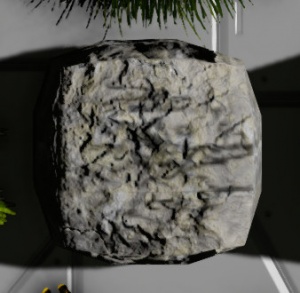
Color varies slightly. Typically a matte midtone grey, the appearance of stone can vary a bit between brown and black.
Rarity: 31% [1]
Iron Ore (Fe)
1,000,000 mg
1.0e-3 t
2.368e-5 Large-Blocks
0.00296 Small-Blocks
0.037 hL
370 mL
700,000 mg
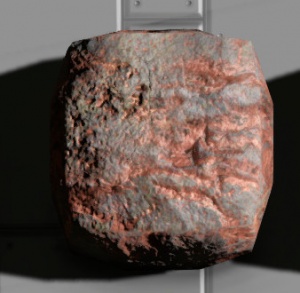
Red and Grey. Iron is fairly easy to identify due to being so common and in such contrast to the grey of the surrounding stone. Focus on looking for reddish, rust-colored areas if Iron is a priority.
Rarity: 50% [1]
Nickel Ore (Ni)
1,000,000 mg
1.0e-3 t
2.368e-5 Large-Blocks
0.00296 Small-Blocks
0.037 hL
370 mL
400,000 mg
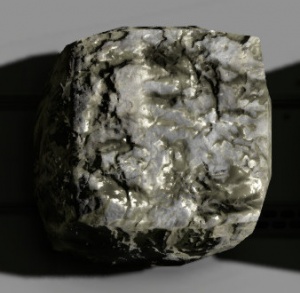
Brown. Nickel is a straight, flat, brown, which when it spawns next to Iron shows strikingly enough to be discernable.
Rarity: 2% [1]
Cobalt Ore (Co)
1,000,000 mg
1.0e-3 t
2.368e-5 Large-Blocks
0.00296 Small-Blocks
0.037 hL
370 mL
300,000 mg
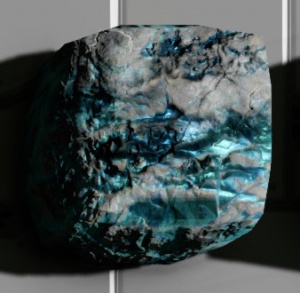
Blue. The blue streaks are relatively easy to see, but it could be mistaken for Magnesium and vice-versa. The best way to distinguish between them is that cobalt ore has a much lighter blue and has more bluish color than grayish base.
Rarity: 2.2% [1]
Magnesium Ore (Mg)
1,000,000 mg
1.0e-3 t
2.368e-5 Large-Blocks
0.00296 Small-Blocks
0.037 hL
370 mL
7,000 mg
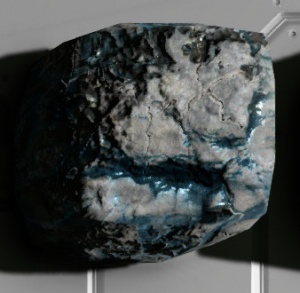
Blue. Rather distinct, Magnesium is not very hard to identify, but is fairly rare, so always keep a look out for the bluish hue!
Rarity: 2.4% [1]
Silicon Ore (Si)
1,000,000 mg
1.0e-3 t
2.368e-5 Large-Blocks
0.00296 Small-Blocks
0.037 hL
370 mL
700,000 mg
Grey. One of three greyish ores, Silicon can be the most difficult to spot due to how close its color and texture are to base stone. Its color will often vary to a light grey, almost white sheen, so look for uncharacteristically light patches.
Rarity: 2% [1]
Silver Ore (Ag)
1,000,000 mg
1.0e-3 t
2.368e-5 Large-Blocks
0.00296 Small-Blocks
0.037 hL
370 mL
100,000 mg
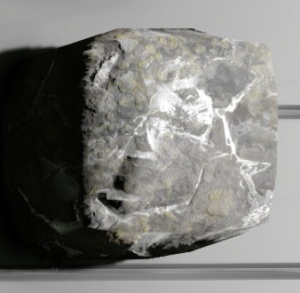
Bluish-Silver. Another grey ore, Silver can be differentiated between Platinum most by its contrast: dark areas are jet black, while highlights are bright white. "Shiny" is an apt description.
Rarity: 2% [1]
Gold Ore (Au)
1,000,000 mg
1.0e-3 t
2.368e-5 Large-Blocks
0.00296 Small-Blocks
0.037 hL
370 mL
10,000 mg
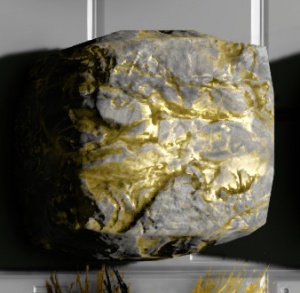
Gold. Very distinct. Can vary more to a grey-yellow in small patches or where it starts to mix with stone or iron.
Rarity: 2% [1]
Platinum Ore (Pt)
1,000,000 mg
1.0e-3 t
2.368e-5 Large-Blocks
0.00296 Small-Blocks
0.037 hL
370 mL
5,000 mg
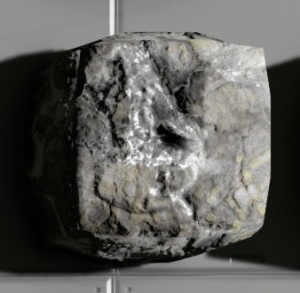
Grey. Can be hard to differentiate between this and stone or silicon. The most reliable distinction is the texture rather than color: stone and silicon have a rough look, while platinum is smooth.
Rarity: 2% [1]
Uranium Ore (U)
1,000,000 mg
1.0e-3 t
2.368e-5 Large-Blocks
0.00296 Small-Blocks
0.037 hL
370 mL
10,000 mg
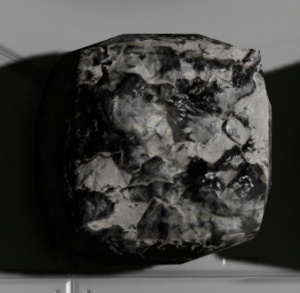
Black. Jet black, very shiny. Hard to miss, even in shadow (unless your server's Skybox has low light).
Rarity: 4.4% [1]
Ice
1,000,000 mg
1.0e-3 t
2.368e-5 Large-Blocks
0.00296 Small-Blocks
0.037 hL
370 mL
100,000 mg
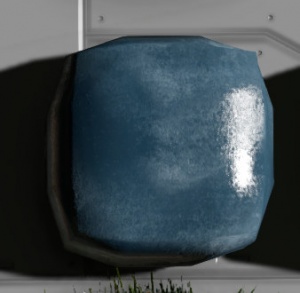
Blue. Blue and White, Shiny.
Scrap Metal
1,000,000 mg
1.0e-3 t
1.6256e-5 Large-Blocks
0.00203 Small-Blocks
0.0254 hL
254 mL
800,000 mg

While technically not a mineral, it behaves just like the other ores. Scrap is acquired by drilling Blocks or grinding damaged blocks.
Refining
Each Ore (including Stone) yields some sort of usable Material once it has been refined within a Refinery or Basic Refinery. Each Ore (except for Stone) has exactly one type of Material that it produces, at various rates of efficiency; e.g. 1000 kg of Uranium Ore will not produce 1000 kg of Uranium Ingots. See each type of refiner (Refinery, Basic Refinery, Survival Kit) for their conversion tables.
| Raw Materials |
|
• • • • • • • • • • • •
|
References
- ↑ 1.0 1.1 1.2 1.3 1.4 1.5 1.6 1.7 1.8 1.9 File:Ore Rarity Test.xlsx Space Engineers v01.047 - New World Generator, Asteroids Scenario, Extreme Asteroid Amount (16 large, 80 small)